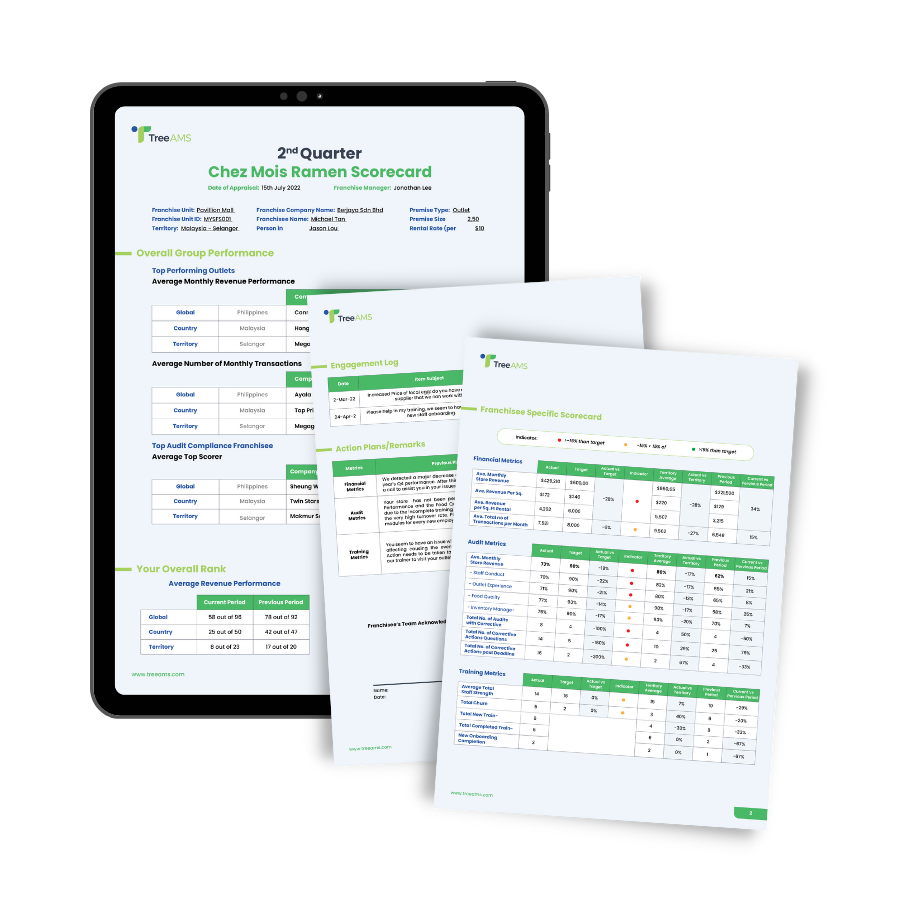Managing a franchise business can be a complex task that involves tracking many parameters across multiple franchisees and countries. While traditional financial metrics like return on investment and earnings-per-share provide important information on past performance, they are not enough to guarantee ongoing success.
The COVID-19 pandemic has highlighted the need for multi-unit businesses to be agile and proactive in responding to unexpected challenges, and financial metrics alone cannot provide the necessary insight for this. To truly understand and optimize franchise network performance, it is also essential to measure non-financial metrics such as customer satisfaction, operational success, quality, cycle time, and employee motivation.
To stay ahead, franchisors need a comprehensive and technology-aided solution like Franchise Scorecards that measures and presents both financial and operational performance on a single view to help guide their businesses towards growth. In this blog, we will explore the importance of franchise scorecards in maximizing franchise unit performance and provide tips on how to develop effective franchise scorecards.
What is Franchise Scorecard?
A Franchise Scorecard is a digital tool for franchisors, franchise managers, and multi-unit business owners to monitor and evaluate the performance of their franchise units. Much like a school report card, they provide a comprehensive overview of a franchise unit’s overall health and allow operators to identify areas where improvements can be made.
The franchise scorecards typically include metrics or KPIs relevant to the specific business model, such as revenues, operations, and growth goals. By implementing a franchise scorecard, operators can quickly view a unit’s overall performance and compare key performance metrics in various areas against their peers’ average (global level, country level, or territory level) on a timely basis.
When compiled, they become historical data with past conversations that can be used as a basis to make smart decisions for ongoing support and discussions with individual franchise units to improve their overall performance and profitability.
For the scorecard to be effective, it should be developed with a balanced view that considers different aspects of the franchise business.
Here are some practical applications of using franchise scorecards based on different perspectives:
The Customer Perspective
- Quality Assurance: By setting quality goals, franchisors can ensure that all franchisees meet product and service quality standards. Franchise scorecards can help monitor, evaluate and provide feedback to franchisees.
- Cost Control: Monitoring costs from a customer perspective can help franchisees ensure that they are offering competitive prices and value for money. The franchise scorecard can track expenses and compare them with industry benchmarks, providing valuable insights into cost-saving opportunities.
- Delivery Time Management: By setting goals for the delivery time, franchisors can ensure that franchisees are meeting customer expectations for prompt service. The franchise scorecard can track and monitor delivery times, allowing franchisees to identify and address any issues before they become a problem.
- Performance and Service Tracking: By setting performance and service goals, franchisors can ensure that franchisors are providing the highest level of customer service. Franchise scorecards can track the metrics on customer service and provide insight into areas for improvement.
To regularly monitor and evaluate performance, an audit plan should be in place. This can be time-consuming for franchise managers, but with the help of franchise management technology, much of the manual work can be streamlined. Franchise technology can automate the scheduling, collection, and reporting of audit results, allowing franchise managers to focus on managing their franchisees.
A well-managed Franchise Scorecard from the customer’s perspective leads to a consistent brand experience, satisfying customer needs.
Engagement, Learning, and Compliance Perspective
- Engagement and Communication: Franchise scorecards provide a platform for franchise managers to engage in meaningful conversations with franchisees. By monitoring performance across key metrics, franchise managers can identify areas of success and improvement and provide feedback to franchisees.
- Identifying Opportunities for Improvement: By tracking performance across key metrics, franchise managers can identify trends and opportunities for further analysis and strategy development. This can help franchise businesses continuously strive for innovation and improvement in their products and services.
- Motivating High-Performing Franchisees: The franchise scorecard can provide a means to motivate high-performing franchisees by recognizing their achievements and setting goals for their continued success.
- Addressing Underperformance: The franchise scorecard provides a data-driven approach to addressing underperformance by identifying areas where franchisees may need additional support or training.
- Boosting Compliance: For a franchise business to thrive and grow, the franchisor must maintain brand consistency and quality across all franchise units. The franchise scorecard should also include benchmarks for franchisees regarding compliance with legal, health and safety, brand, human resource, and tax requirements.
A successful franchise system depends on the franchisor’s ability to continuously improve and learn, enhancing the franchise organization’s value. Utilizing franchise scorecards to drive these conversations is a critical component to ensure the success of the franchise network.
Financial Perspective
- Determining Franchise Success: Measuring financial performance is key to determining the success of a franchise’s strategy and execution. The franchise scorecard provides a comprehensive view of financial performance, including revenue, cost of goods, and profitability.
- Franchise Unit Performance: The franchise scorecard provides a snapshot of the financial performance of each franchise unit, allowing franchisors to track and monitor the financial health of their franchise network.
- Profit Analysis: The franchise scorecard can be used to analyze profitability and identify areas for improvement. While profitability is important, it’s important to remember that strong financials don’t always indicate strong performance and vice versa, so it’s crucial to consider other factors when evaluating franchise unit performance.
- Budget Management: The franchise scorecard can be used to manage budgets and track expenses, allowing franchisors to identify cost-saving opportunities and control costs.
- Investment Monitoring: The franchise scorecard can be used to monitor franchisee investment and return on investment, providing valuable insights into the financial health of the franchise network.
Summing it up
Maximize your franchise network’s success with the help of franchise scorecards. This tool provides a way to measure and monitor financial and qualitative performance, identify areas of strength and improvement, and drive growth. To make the most of this tool, consider incorporating performance measurement, data-driven conversations with franchisees, continuous improvement, and technology integration into your franchise management strategy.
Franchise scorecard is a feature that can only be found on comprehensive franchise management software . Empower your franchise network with the benefits of a well-implemented franchise scorecard.


.png)



